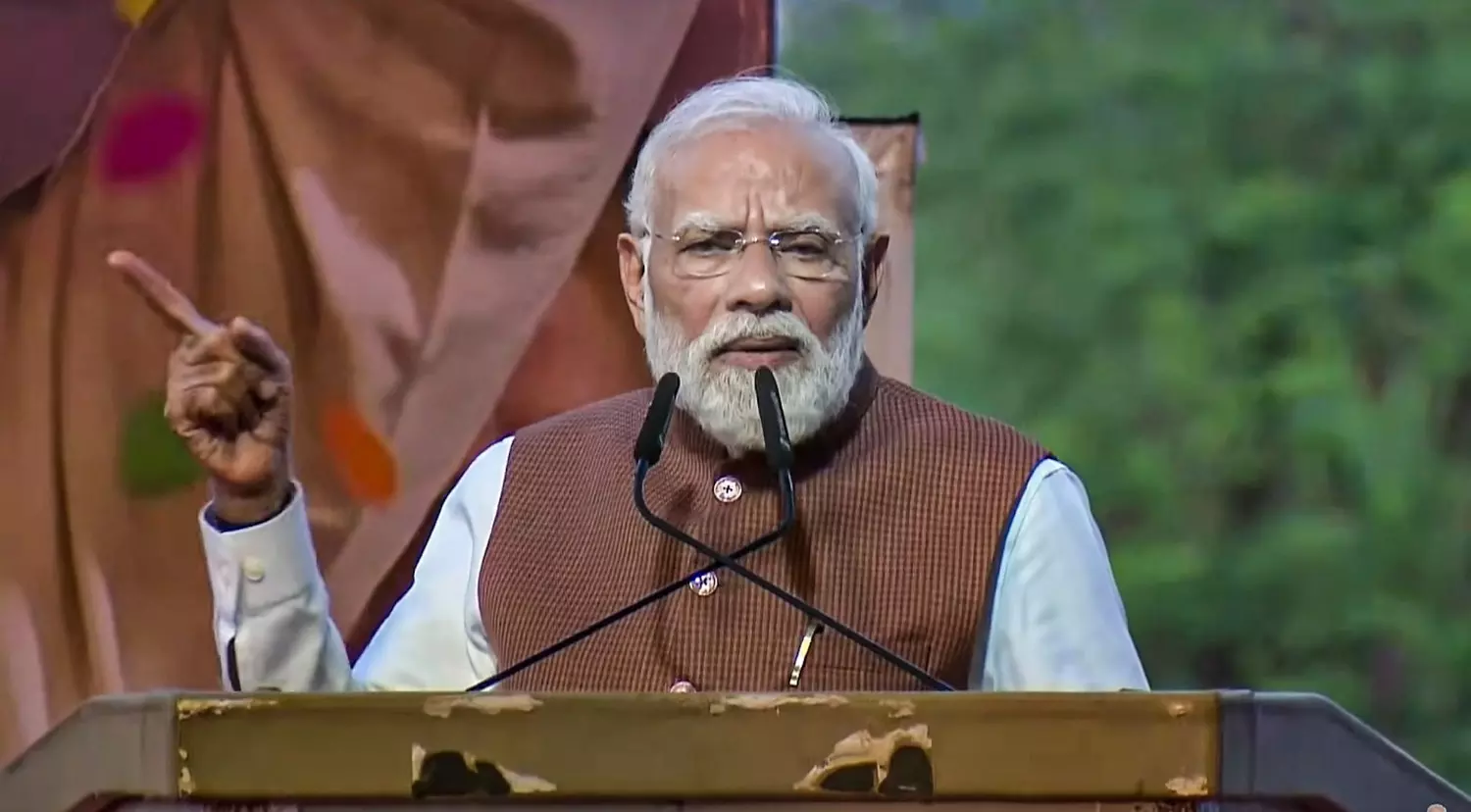
- Home
- India
- World
- Premium
- THE FEDERAL SPECIAL
- Analysis
- States
- Perspective
- Videos
- Sports
- Education
- Entertainment
- Elections
- Features
- Health
- Business
- Series
- In memoriam: Sheikh Mujibur Rahman
- Bishnoi's Men
- NEET TANGLE
- Economy Series
- Earth Day
- Kashmir’s Frozen Turbulence
- India@75
- The legend of Ramjanmabhoomi
- Liberalisation@30
- How to tame a dragon
- Celebrating biodiversity
- Farm Matters
- 50 days of solitude
- Bringing Migrants Home
- Budget 2020
- Jharkhand Votes
- The Federal Investigates
- The Federal Impact
- Vanishing Sand
- Gandhi @ 150
- Andhra Today
- Field report
- Operation Gulmarg
- Pandemic @1 Mn in India
- The Federal Year-End
- The Zero Year
- Science
- Brand studio
- Newsletter
- Elections 2024
- Events
- Home
- IndiaIndia
- World
- Analysis
- StatesStates
- PerspectivePerspective
- VideosVideos
- Sports
- Education
- Entertainment
- ElectionsElections
- Features
- Health
- BusinessBusiness
- Premium
- Loading...
Premium - Events

Introduction of English-language education paved the way for Indians to enter the world of modern knowledge, and for the oppressed castes to enter the world of learning
Prime Minister Narendra Modi gets it wrong on Macaulay. Give the devil his due. His introduction of English language education in India is one of the good things colonialism did for India. It paved the way for Indians to enter the world of modern knowledge, to savour the fruits of the scientific revolution that swept across Europe and turned the world of scholarship upside down in the 16th and 17th centuries, and for the oppressed castes of India to enter the world of learning, from which Indian tradition had excluded them, and for the enrichment and growth of India’s regional languages and cultures. English education introduced Indians to the concepts of liberty, equality and fraternity, totally alien to monarchy and the caste system.
Macaulay and English education in India
All those who condemn Macaulay’s Minute on Education, for initiating the substitution of education in the English language for the traditional schooling that the British funded in India, simultaneously condemn Ambedkar, who called English “the milk of a lioness”, enabling those who drank it to roar. It is Macaulay’s insistence on the colonial government ceasing to fund Sanskrit (the Minute spells it as Sanscrit) and Arabic (Macaulay was ignorant enough to confuse Persian for Arabic) that paved the way for modern education, for CV Raman, Jagdish Chandra Bose, Satyendra Nath Bose, GN Ramachandran, Rabindranath Tagore, Gandhi and Nehru.
Also Read: Why Bihar lost before a single vote was cast
English education instilled an inferiority complex, it is true, among those who lived up to Macaulay’s expectation that it would create “a class of persons, Indian in blood and colour, but English in taste, in opinions, in morals, and in intellect”. But many Indians learned the language and, instead of serving to “form a class who may be interpreters between us and the millions whom we govern”, as Macaulay put it, savoured the values of the European Enlightenment and ideas of democracy, to initiate a struggle for freedom from colonial rule.
For the most part, formal grammar for Indian languages was created by Europeans. Of course, their purpose was to get the translation of what they believed to be the word of God, the Bible, right. The purpose of most pharmaceutical research is to make profits for the companies that undertake such research. But does anyone say they would not cure themselves of typhoid because ciprofloxacin and azithromycin were developed to make dirty profits? Most Indian languages flourished, fortified by formal grammar. Literature in these languages rose to levels comparable to those reached by literature anywhere in the world. It is mostly English that permits those so inclined to access the literary richness of Indian languages in translation.
The Indian Penal Code
Laws were codified by the British, and these laws applied to all Indians and did not privilege certain sections, as traditional law did. Many traditionalists venerate Manusmriti, the ancient text of Hindu law. It is built on the presumption that the Brahmin is the lord of all creation, and that the purpose of the rest of humanity is to serve the Brahmin. An act that was a crime for the working man and woman, who toiled on the land, was often the right of the priestly class.
Also Read: Why Mamdani’s New York win resonates well beyond the City — and the US
Macaulay was also the author of the Indian Penal Code, which governed all Indians, at least normatively, instead of privileging small sections over the majority. The present government claims to have replaced the IPC with indigenous law. It is a new law only in the sense in which Amitabh Bachchan is a new man when he plays Jai in Sholay, compared to when he played Vijay Khanna in Zanjeer or that Valala in the Mahabharata (Vallabha in some versions), who kills Kichaka as he torments Draupadi, was different from Bhim.
British era and modern administration
The British laid the foundations of a modern healthcare system, public order machinery, decentralised administration and systematic accounting. They introduced modern industry in India, opened the Bombay Stock Exchange and established the institution of the widely held joint stock company.
The British also instituted representative government, of course, subject to the authority of the Crown, trade unions that took part in the early deliberations at the International Labour Organisation, and laws to govern working conditions in factories, mines and plantations.
Also Read: Trump talks of G2, but dual global hegemony is whimsy for now
The British surveyed India, its geography, flora and fauna. It enumerated Indians with the decennial Census.
Most significantly, the British converted India from an ancient civilisation into a modern nation-state. The anti-colonial struggle spread over nearly a century unified, for the first time, the peoples of the subcontinent, ruled by kings, princes, nawabs and whoever else could muster enough force to carve out a principality for themselves, into the People of India, with a democratic Constitution and a modern administrative machinery to govern the land.
PM Modi on ancient Indian monuments
The Prime Minister referred to ancient monuments and how those with regard for their history and culture preserve the physical remnants of their past and even convert them into tourist attractions. Many of India’s monuments had been buried under layers of neglect, sediment and wild overgrowth. British administrators rediscovered, for example, the wonders of Sanchi and Khajuraho. British archaeologists uncovered Harappa and Mohenjo Daro.
The harm that the British did to India is often reiterated. The good lies mostly interred with the bones of those Britons who were buried here. We should have the honesty to credit the good, while faulting the bad.
Macaulay and ancient Indian knowledge
Macaulay’s Minute shows acute ignorance of ancient India’s contributions to mathematics and astronomy, and medieval India’s advances in architecture, logistics and town planning. His disdain for India’s achievements in literature is less marked than his contempt for India’s contributions to science, mathematics and philosophy.
Also Read: Opinion India should keep buying Russian oil, but not from Rosneft and Lukoil
That ignorance permeates the bulk of India’s contemporary elites, who are proud of their English-medium education and foreign degrees, but cannot name an ancient poet other than Kalidasa, have not marvelled at Kalidasa’s own similes, the beauty of Bhasa’s language and the scholarship of Magha.
They keep spouting the nonsense that Sanskrit is the mother of all Indian languages, but are unaware that in Sanskrit plays, minor characters and most women spoke some Prakrit or the other, that only the elite spoke Sanskrit. Modern North Indian languages are derived from assorted Prakrits, while the South Indian languages are derived from a proto-Tamil that belongs to a family of languages altogether different from that of North Indian tongues.
The evil done by the British
Such alienation from Indian culture is the product of learning in the English medium, not of learning English. Without proficiency in English, a Japanese scientist might be able to carry out Nobel-prize-winning research. To equip Indian languages to carry out such research, registers of technical terms in different disciplines have to be developed and standardised, and armies of translators with mastery over English put to constant work translating into Indian languages not only standard textbooks but also new research findings. Without widespread proficiency in English, higher education in Indian languages would be a dream.
Also Read: Why Donald Trump could still deserve a Nobel Peace Prize
But some of the evil that the British did lives on, to poison the lives of Indians today. The communal divide between Hindus and Muslims is one. Even more damaging has been the European idea of nationhood, as being defined by a single language, religion and homogeneous culture over a territory. This idea of nationhood is at variance with India’s civilizational genius for acceptance of diversity. Democracy can meld diversity into unity, provided such diversity is compatible with its norms. The European version of Indian nationhood seeks forcible elimination of diversity at the point of the sword, to the chant of “Jai Shri Ram” or “Vande Mataram”.
Elimination of this corrupting, distorted view of nationhood is the most urgent task of reclaiming India’s historical authenticity.
(The Federal seeks to present views and opinions from all sides of the spectrum. The information, ideas or opinions in the articles are of the author and do not necessarily reflect the views of The Federal.)


